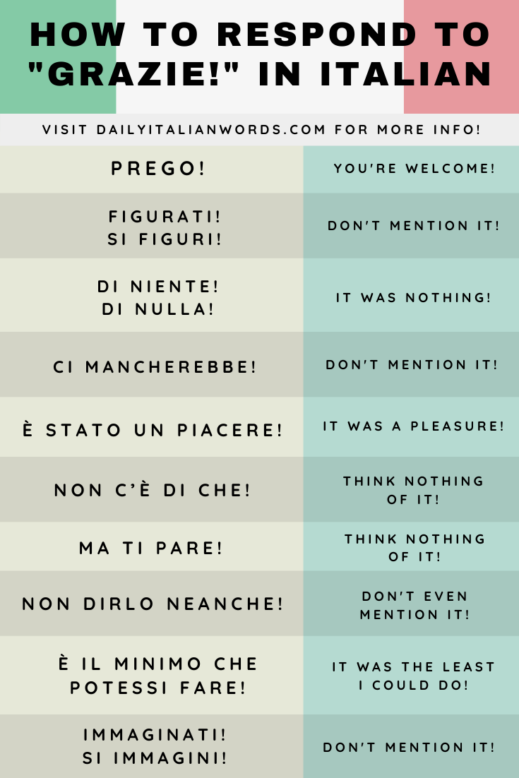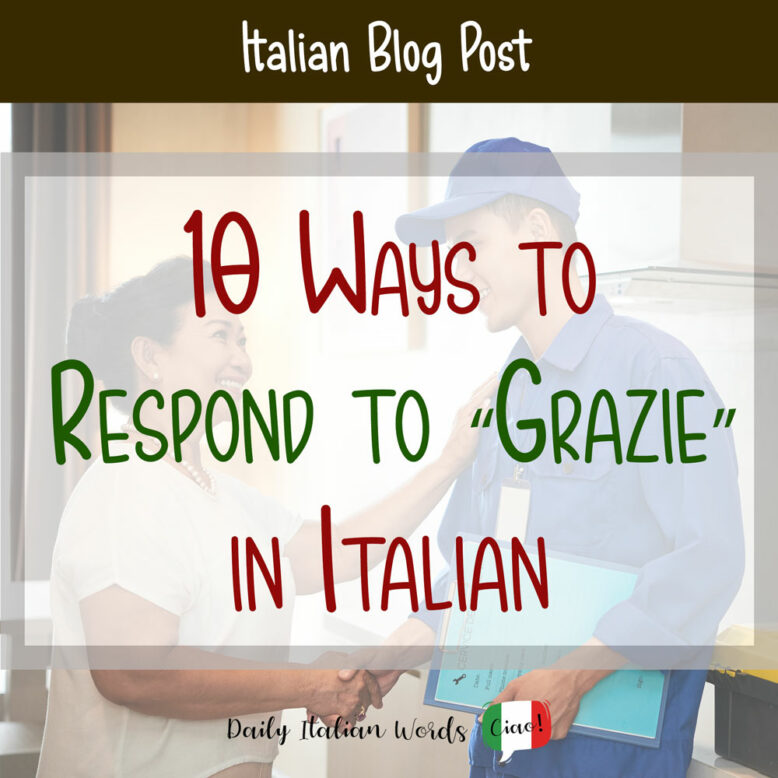When someone says “Thank you!” in English, there is more than one way we can respond depending on the formality of the situation and who we are talking to. Unsurprisingly the same applies to the Italian language.
In this article, we take a look at ten of the most popular ways of responding to “Grazie!” (Thank you!). No matter what situation you find yourself in, you can be sure that one of these expressions will suit the occasion.
If, after reading this article, you happen to think of some other responses, do let us know in the comments section below! 🙂

1. Prego
The classic response to grazie is the solitary word prego, which originates from the verb pregare (to pray, beg or request). It is the safest way of saying “you’re welcome” as it can be used with anyone, irrespective of their age or status.
Grazie per avermi aiutato. – Prego!
Thank you for helping me. – You’re welcome!
2. Di niente / di nulla
The informal expressions di niente and di nulla are similar to the English no problem or it was nothing. Whether you use niente or nulla is a matter of personal preference. A third alternative is nessun problema which literally means no problem.
Grazie per il regalo! – Di niente!
Thanks for the present! – It was nothing!
3. Figurati / Si figuri
A substitute for prego that you’ll hear all the time is figurati (informal) or si figuri (formal). Both come from the verb figurare which means to imagine, amongst other things.
This expression has a slightly more emphatic tone than prego, as it underlines the fact that it cost the speaker nothing to do the thing for which they are being thanked.
Grazie per avermi riaccompagnato a casa. – Ma figurati!
Thanks for driving me home. – Hey, no problem at all!
4. Ci mancherebbe (altro)
Ci mancherebbe (altro) is very similar to figurati in that it emphasises the willingness of the speaker to help the person who is thanking them. It comes from the verb mancare which means to miss. Whether or not you choose to add altro to the end is completely up to you.
Grazie per avermi aiutato a portare su la spesa! – Ci mancherebbe altro!
Thank you for helping me carry the groceries upstairs! – Don’t mention it!
5. È stato un piacere
A very common way of saying you’re welcome is è stato un piacere which literally translates as it was a pleasure. This phrase often accompanies many of the other expressions already mentioned above.
Grazie per avermi aiutato a preparare l’esame. – Ma figurati, è stato un piacere.
Thank you for helping me prepare for the exam. – No problem at all, it was a pleasure.
6. Non c’è di che / E di che?
If you don’t want the other person to feel as if he or she owes you something for your help, you can use the expressions Non c’è di che / E di che? Both are similar to the expressions don’t mention it or think nothing of it in English.
Grazie per avermi detto la verità. – Non c’è di che.
Thank you for telling me the truth. – Don’t mention it.
7. Ma ti pare / Ma le pare
The literal translation for the phrases ma ti pare (informal) or ma le pare (formal) is but it seems that way to you but they are similar in meaning to non c’è di che.
Grazie per il tuo aiuto oggi. – Ma ti pare.
Thanks for your help today. – Think nothing of it.
8. Non dirlo neanche
Non dirlo neanche translates as don’t even mention it and it can be used in similar situations to non c’è di che and mi ti pare. It is often accompanied by per scherzo (as a joke) or per sogno (as a dream).
Ti ringrazio di cuore per tutto quello che hai fatto. – Non dirlo neanche per scherzo. Vedrai che andrà tutto bene.
Thanks for everything. – Don’t even mention it. You’ll see that everything will be fine.
Note: this expression can be used in other situations to reassure someone. For example, if a friend says Non riuscirò mai a trovare un lavoro! (I’ll never find myself a job), you can console them by saying Non dirlo neanche per scherzo / sogno.
9. È il minimo che potessi fare
The expression è il minimo che potessi fare (it’s the least I could do) also exists in English and the meaning is exactly the same.
Grazie per esserti preoccupato. – Figurati, è il minimo che potessi fare.
Thank you for being concerned. – No problem, it was the least I could do.
10. Immaginati / Si immagini
Our final expression is a synonym for figurati / si figuri. It comes from the verb immaginarsi (to imagine / see yourself). The formal version tends to be heard much more often than the informal version.
La ringrazio per tutto quello che ha fatto per mia figlia. – Ma si immagini, ho fatto solo il mio lavoro.
Thank you for everything you’ve done for my daughter. – My pleasure, I only did my job.
Note: as you might have already seen in a few sentences, many of these expressions can be grouped into pairs to reinforce your answer. For example, it is common to hear Prego, figurati! or Ci mancherebbe, è stato un piacere! used together as a response to grazie.


Heather Broster is a graduate with honours in linguistics from the University of Western Ontario. She is an aspiring polyglot, proficient in English and Italian, as well as Japanese, Welsh, and French to varying degrees of fluency. Originally from Toronto, Heather has resided in various countries, notably Italy for a period of six years. Her primary focus lies in the fields of language acquisition, education, and bilingual instruction.


